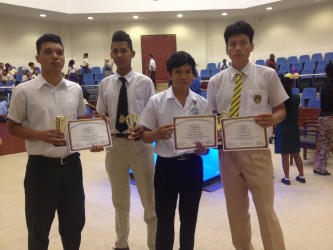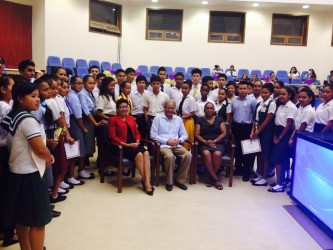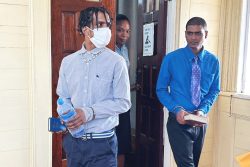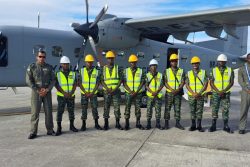Sixty-nine graduates from the Hinterland Scholarship Programme on Thursday celebrated their success at a small graduation ceremony held at the Arthur Chung Convention Centre.
Rosamond Daley, the senior social worker tasked with supervising the students in the programme, beamed with pride when she reported that the 2014 batch of students had surpassed their 2013 predecessors by obtaining a 91.4% pass rate compared with 84.1% in 2013.

She singled out three students who will embark on overseas scholarships obtained through their outstanding academic achievements. Shania Wilson secured Grade One passes in English A and B after sitting the exams in the second form. Now a fourth form student, she wrote 13 subjects at this year’s CSEC exams and plans to enrol in the Sixth Form in September. Kyle Joseph, who was the third best graduating Hinterland Scholarship student in 2014, has since secured a scholarship to pursue studies in medicine in Canada starting September. Joseph, who hails from Aishalton, served as the Chairman of the graduation exercise.
In addition, St. Stanislaus College student Dolly Chambers, of Purima Village, in Region Seven, also has achieved stellar results that have seen her being selected to participate in the US Youth Ambassador’s programme. She will be leaving for Washington, DC in September. In her closing remarks, Daley urged the graduates to go forth with confidence and reminded them that they have the resilience to overcome whatever challenges that may come their way.
‘Overcoming adversity’
In her feature address at the ceremony, Minister within the Ministry of Indigenous Peoples’ Affairs Valerie Garrido-Lowe urged the graduates to be proud of their heritage even as they move on to higher institutions of learning.

“Graduating from the hinterland scholarship programme is no easy task; few would understand the sacrifices you have made. It is not easy to leave your parents’ home to embark on such a journey at such a young age,” she said to the group, which comprised 63 high school students and six technical scholarship awardees.
Speaking about complaints about race abuse, which she said she had heard of repeatedly, Garrido-Lowe praised the graduates for excelling despite those challenges. “Unfortunately, the indigenous students are still subjected to forms of humiliation, in one way or the other; many persons to fail to understand that to be different is to be normal,” she said. “They see our cassava bread, roast pork and fish, sweet piwari and other beverages, and don’t understand that it is normal food for us.”
She also encouraged them to draw strength from adversity. “I want you to know that I understand the challenges, it’s hard and it hurts you and it knocks at your self-confidence but for those of you who have completed the 5 years, and are going on to further your studies, you are strong for accomplishing this,” she said.
The minister told the graduates that they were at the beginning of new journeys. “I see in front of me the future of Guyana and more importantly the future leaders of our Indigenous population. You are the workers of tomorrow. Our President has said many times that educating Hinterland people is of vital importance, that the Hinterland is not another country, it is part of Guyana,” she said.
According to Garrido-Lowe, government plans to establish technical institutes in regions One, Seven, Eight and Nine, so that upon graduation indigenous students can access technical education in their respective regions.
Meanwhile, in his speech, Education Minister Dr Rupert Roopnaraine reiterated the ministry’s plans to bridge the gap between the quality of education offered on the coastland and that of the hinterland. Describing the programme as one that “preceded the country’s political independence,” he said the reforms aim “to ensure that there will not be significant changes in the education of any child who is transferred from the Coast to the Hinterland.”
In an era in which sustainable development of the country’s natural resources and natural environment is emerging as critical to global human survival, Dr Roopnaraine noted that there has been a recent upsurge in interest from academic researchers and others about the unique values and education offered in the Hinterland.
“We are fast approaching an age where the traditional cultural knowledge of our primarily untouched Hinterland, the capacity to live harmoniously with the natural environment is quickly gaining premium value,” he said. “From the local production of the Rupununi Music Festival to television shows like ‘Naked and Afraid,’ which was recently filmed in Guyana, there is an increasing number of academic researchers across the wide spectrum of academic disciplines who are venturing into the regions,” he added.
Towards this end, he said the idea of affording ambitious students from the coast an opportunity to learn in an environment which reflects the true wealth of Guyana’s landscape can be explored. “In essence, even as we seek to build on the gains of this historic scholarship, we also have to start rethinking the mechanics of it, to offer more of an exchange programme than in a unidirectional mechanism. It is time we start recognising that we have a great deal to learn from the Hinterland,” he asserted.
After the traditional presentation of certificates, some students were given special awards for consistent academic performance, good deportment as well as for participation in extra-curricular activities.
The Hinterland Scholarship Programme provides academic opportunities at both the secondary and tertiary levels, and promotes the integration of hinterland students, into the wider Guyanese society. It also affords them the opportunity to benefit from quality secondary and technical education, not accessible in their communities. This programme is supported by the Government of Guyana, through the Ministry of Indigenous Peoples’ Affairs, and provides students with a monthly stipend, school necessities, accommodation and meals.






